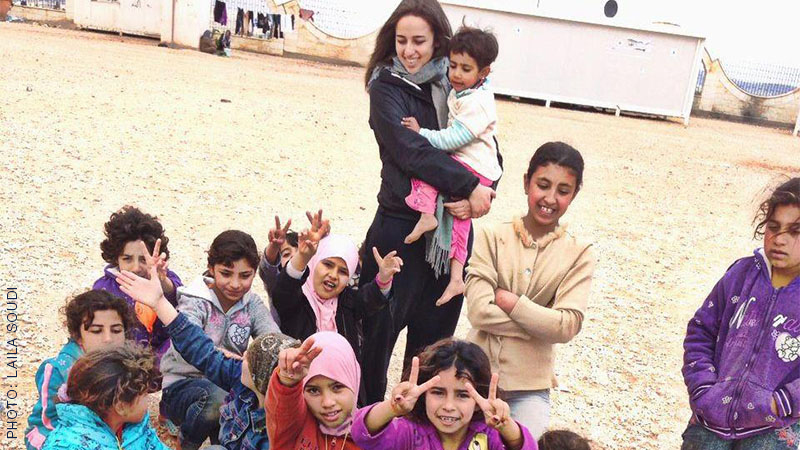
Laila Soudi, MS ’15, wants to make things better for refugee children. She has seen how conflict and displacement can affect refugees, and is a passionate advocate for mental health services for them. She is especially concerned about the mental health of Syrian children.
The current conflict in Syria has produced a staggering number of refugees and internally displaced people. The recent chemical attack there exemplifies the trauma that civilians have experienced throughout six years of civil war. “Kids in Syria are growing up in a country where bombing hospitals has become the norm,” Soudi said. “They are severely traumatized as a direct result of these things, and we must act now to ensure better mental health services for them.”
Soudi’s efforts to provide refugee mental health services earned her the 2017 Velji Emerging Leader in Global Health Innovation Award from the Consortium of Universities for Global Health (CUGH), which she received at their conference in Washington, DC on April 8. Michele Barry, MD, director of Stanford University’s Center for Innovation in Global Health, nominated Soudi for her “relentless, bold leadership in global mental health,” including publishing articles during a media blackout that called for humanitarian aid to Syria and creating a refugee mental health working group for faculty at Stanford, where she now works.
Soudi said the CUGH award “is not for anything special I did, but I view it as a commitment to spend the rest of my life enhancing conditions for refugee populations.”
The seed for her work was planted in her own childhood. The daughter of Syrian and Palestinian parents, she grew up in Jordan, and she and her family would visit refugee camps to bring food, provisions, and friendly company.
Soudi was drawn to study mental health, and pursued her undergraduate degree in psychology and neuroscience at UC Berkeley. She then chose the UCSF Master of Science in Global Health program to understand where mental health fits in the global health agenda and to gain technical and research skills. She became acutely aware of the shortage of mental health services for refugees.
For her master’s capstone research, Soudi conducted a systematic review of studies of mental illness among displaced populations in the Middle East. She also returned home to Jordan to work with NGOs in refugee camps to get a sense of the availability of mental health services and identify the gaps. According to some estimates, refugees comprise roughly a third of the overall population of Jordan, including up to 2 million Syrians. She believes Jordan has only 150 mental health clinicians, at most.
Soudi sees a lack of action on the issue: “The global health community has failed when it comes to global mental health. It has also failed miserably when it comes to refugee health.” To address the urgent need for refugee mental health services, Soudi wants to see more funding and opportunities for global health practitioners to go into this field.
After graduating from UCSF, Soudi took a research job at Stanford University focusing on children with early-onset mood disorders. While there, she found people who wanted to address the refugee crisis in the Middle East.
She connected with Victor Carrion, MD, a faculty member in psychiatry and behavioral sciences who is examining pediatric anxiety and trauma. When he mentioned an interest in making his work global, Soudi told him, “You have to look at Syrian children because they have been exposed to more trauma than ever imaginable.”
The connection was fortuitous: a few months ago, Soudi began working with Dr. Carrion in the Early Life Stress and Pediatric Anxiety Program to help expand the group’s global mental health efforts. They are examining the mental health of Syrian child refugees exposed to trauma and torture, with the goal of building mental health treatment programs.
Soudi also is expanding upon her master’s research, creating a meta-analysis of data on the prevalence of mental illness among refugees and examining why reported rates vary widely. For example, estimates of Post-Traumatic Stress Disorder (PTSD) experienced by Syrian refugees range from 10 to 90 percent of the population.
Soudi envisions a world in which mental health treatment is accessible to everyone. She believes an effective approach is for specialists to share the responsibilities of providing mental health services with lay people in the community—a practice known as task-sharing. After she pursues additional training, Soudi would like to become a consultant for those communities, helping build local capacity for mental health care. She also wants to help create an avenue for more students from UCSF, Stanford, and other institutions to get involved in mental health projects in the Middle East.